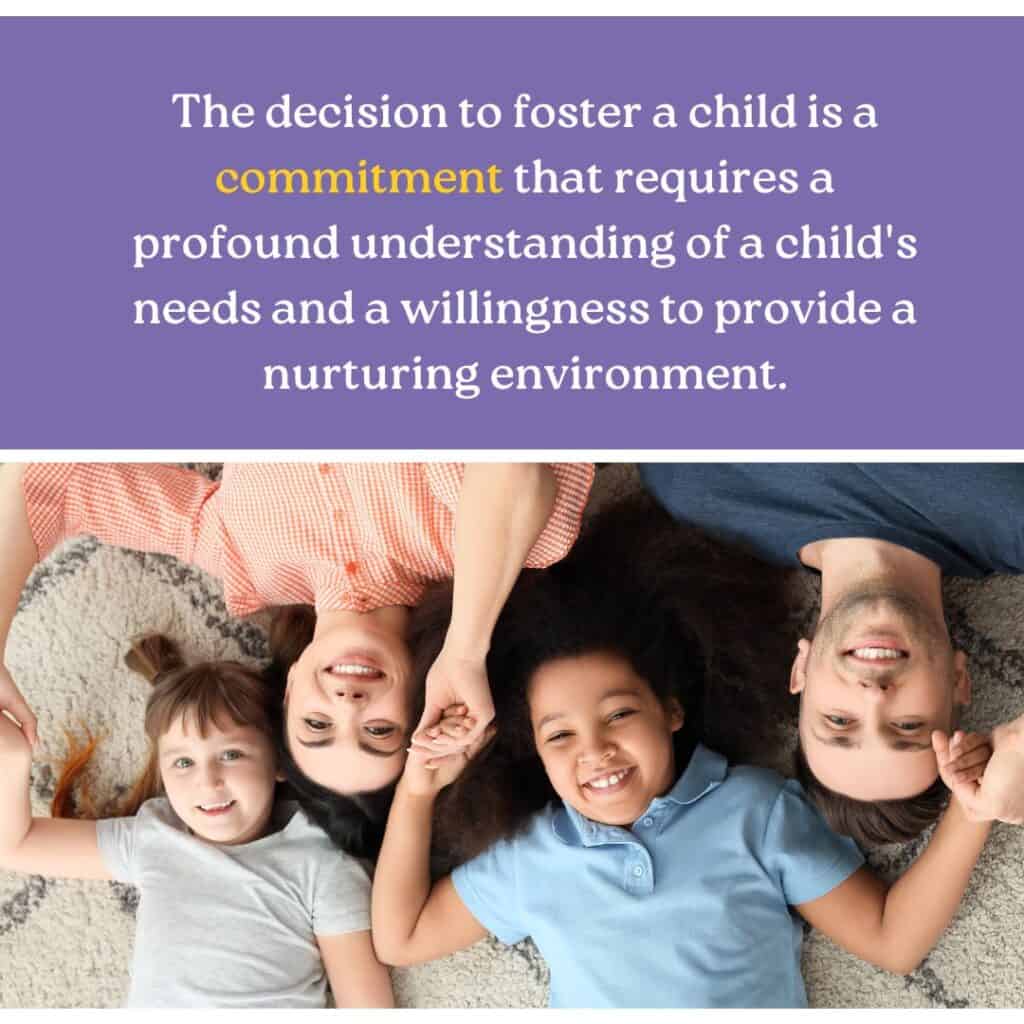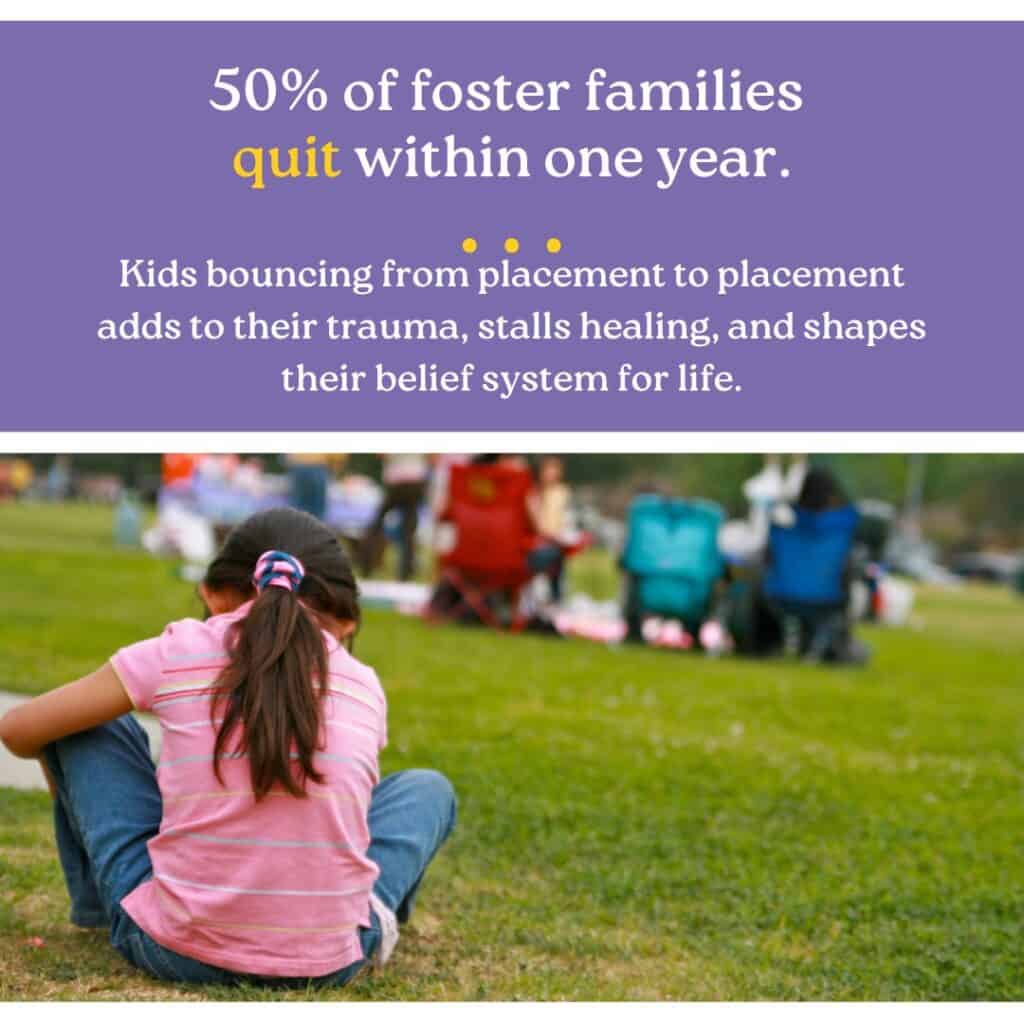So you think you want to become a foster parent? Feeling called to foster care can be a profoundly fulfilling and joyous experience. You may have been inspired by a sermon, moved by statistics, or felt confident raising your biological children. Why not extend your love to a few more? The question may be, ‘Am I ready?’ Just like preparing for your child, it’s a journey filled with questions, unknowns, excitement, and even idealized notions. While we can’t predict everything, we can ensure we’re emotionally, mentally, and spiritually prepared. The twists, turns, disappointments, and joys are all part of the beautiful journey.

The decision to foster a child is not just a practical one but also deeply emotional. It’s a commitment that requires a profound understanding of the child’s needs and a willingness to provide a nurturing environment. We all can feel deeply about foster care, but this doesn’t necessarily mean we’re emotionally ready to open our homes to a child. You may have heard the saying, ‘Not everyone can foster, but everyone can do something.’ I wholeheartedly agree with this sentiment. So, how do you know if fostering a child is the right step for your family?
It’s essential to understand the difference between fostering and adoption. Fostering is meant to be temporary, a bridge to support families in crisis, while adoption is a permanent commitment. Don’t confuse your assignment! When you become a foster parent, you are committed to the child in your home and their entire family. This understanding is crucial as it sets expectations and prepares you for the journey.
Pray for God to give you a heart, not just for a child but for a family. With a prayerful heart, God is faithful to open doors creatively to come alongside, mentor a mom, mentor a dad, and speak life into a grandmother. These relationships, if appropriately nurtured where trust is at its core, can be long-lasting long after a placement leaves your home. When we go into foster care with this as the mission, it assists us in having the proper perspective and mindset.
Before you dive into your decision, resource yourself. There are so many amazing people fostering well. Take time to get to know these families and hear their stories. It will give both insight and perspective. Most enter foster care space with rose-colored glasses, not understanding the impact of trauma on a child and the sometimes challenging behaviors surrounding that. Ensure you glean from a family accepting all facets of foster care, meaning birth families and healthy relationships with their caseworker.

A recommended site to go to for instant resources is Empowered Connect. There are free digital downloads for caregiver support, podcasts, and videos that assist children’s behavior through the lens of trauma. At Wait No More, under resources, there are many, many valuable resources that are good to begin your journey with. There are topics such as attachment and foster care—its importance and the difficulties sometimes surrounding achieving it. Another gem is how to prepare for a transracial foster placement. Education is both power and knowledge—the more we know, the better we do, and more importantly, our kids do.
A Child is Counting on Your Yes. Foster care comes with twists, challenges, and battles. Statistics tell us that 50% of foster families quit within one year. This speaks to it not being easy! A foster care placement is not meant or intended to “try.” Kids bouncing from placement to placement adds to their trauma, stalls healing, and shapes their belief system for life. This is not meant to scare you; it is intended to make you think through when that phone call comes, you hear snippets of their history and circumstances, and they say, “Are you able to assist this child in your home.”

Once that yes is spoken, commit to moving heaven and earth for that kiddo. A mentor once told me that sometimes our yeses are with great joy, and sometimes our yeses are through our tears. With God and a supportive village, your YES will impact a child and an entire generation! It will be your best YES.
The post So You Think You Want To Become a Foster Parent appeared first on Focus on the Family.
Continue reading...

The decision to foster a child is not just a practical one but also deeply emotional. It’s a commitment that requires a profound understanding of the child’s needs and a willingness to provide a nurturing environment. We all can feel deeply about foster care, but this doesn’t necessarily mean we’re emotionally ready to open our homes to a child. You may have heard the saying, ‘Not everyone can foster, but everyone can do something.’ I wholeheartedly agree with this sentiment. So, how do you know if fostering a child is the right step for your family?
How To Know if Becoming a Foster Parent Is Right for Your Family
1. Be Committed to a Family
It’s essential to understand the difference between fostering and adoption. Fostering is meant to be temporary, a bridge to support families in crisis, while adoption is a permanent commitment. Don’t confuse your assignment! When you become a foster parent, you are committed to the child in your home and their entire family. This understanding is crucial as it sets expectations and prepares you for the journey.
Pray for God to give you a heart, not just for a child but for a family. With a prayerful heart, God is faithful to open doors creatively to come alongside, mentor a mom, mentor a dad, and speak life into a grandmother. These relationships, if appropriately nurtured where trust is at its core, can be long-lasting long after a placement leaves your home. When we go into foster care with this as the mission, it assists us in having the proper perspective and mindset.
2. To Become a Foster Parent, Learn, Learn, Learn
Before you dive into your decision, resource yourself. There are so many amazing people fostering well. Take time to get to know these families and hear their stories. It will give both insight and perspective. Most enter foster care space with rose-colored glasses, not understanding the impact of trauma on a child and the sometimes challenging behaviors surrounding that. Ensure you glean from a family accepting all facets of foster care, meaning birth families and healthy relationships with their caseworker.

A recommended site to go to for instant resources is Empowered Connect. There are free digital downloads for caregiver support, podcasts, and videos that assist children’s behavior through the lens of trauma. At Wait No More, under resources, there are many, many valuable resources that are good to begin your journey with. There are topics such as attachment and foster care—its importance and the difficulties sometimes surrounding achieving it. Another gem is how to prepare for a transracial foster placement. Education is both power and knowledge—the more we know, the better we do, and more importantly, our kids do.
3. Count the Cost of Becoming a Foster Parent
A Child is Counting on Your Yes. Foster care comes with twists, challenges, and battles. Statistics tell us that 50% of foster families quit within one year. This speaks to it not being easy! A foster care placement is not meant or intended to “try.” Kids bouncing from placement to placement adds to their trauma, stalls healing, and shapes their belief system for life. This is not meant to scare you; it is intended to make you think through when that phone call comes, you hear snippets of their history and circumstances, and they say, “Are you able to assist this child in your home.”

Once that yes is spoken, commit to moving heaven and earth for that kiddo. A mentor once told me that sometimes our yeses are with great joy, and sometimes our yeses are through our tears. With God and a supportive village, your YES will impact a child and an entire generation! It will be your best YES.
The post So You Think You Want To Become a Foster Parent appeared first on Focus on the Family.
Continue reading...





